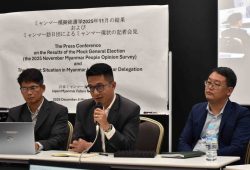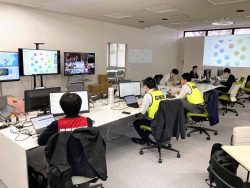14:00 JST, March 6, 2023
In line with the paradigm shift in education through technology, South Korea’s Ministry of Education said recently that digital textbooks for Korean schools will go into use in 2025.
The ministry said it would begin with three subjects: English, mathematics and information. Other subjects will be decided in May. Digital conversion of paper-based books to electronic books will be carried out by developing tailor-made technologies for each subject, helping students and teachers learn and teach the courses efficiently.
Those technologies include the Intelligent Tutoring System, a computer-based learning system that uses artificial intelligence to provide human-like lessons, metaverse and extended reality (XR), a real-and-virtual environment generated by computer graphics and wearables.
Starting in 2025, third- and fourth-grade students, as well as seventh-graders will be the first to benefit from the shift. Grades five, six and eight students will use digital textbooks in 2026 and ninth-graders in 2027. Both print and digital textbooks will be used in classes until 2028 to prevent confusion for educators and students during the transition period.
The ministry said it would also invest in nurturing teachers using e-texts and prepare education sessions for each provincial education office. Also, seven education offices will operate 300 pilot schools for digitalization this year.
Regarding parental concerns about the immediate and long-term effects of exposing students, especially those in lower grades, to gadgets, the ministry plans to build a system that could shield students from harmful websites and internet content.
Local education experts said that the surge of digital-based learning is inevitable, but a systematic approach and proper knowledge about digital education resources are needed.
“Electronic devices can be effective and create many opportunities. To make this feasible, a proper framework for the implementation of digital textbooks must be planned,” Lee Bohm, an education critic, told The Korea Herald.
Referring to South Korea as a latecomer in digital education, Lee pointed out that schools overseas, especially in developed countries, have already transformed to a stage where teachers and students are using devices like the iPad.
The United Kingdom, for example, developed “LendED,” a platform designed to enhance teacher-led classroom learning and improve students’ education outcomes. Germany has made movements through “DigitalPakt Schule,” a digital pact for schools in which the federal government supports the states and municipalities for the digital education infrastructure.
In Asia, Japan has adopted the “Global and Innovation Gateway for All,” equipping elementary and junior high school students with digital learning devices.
“But adopting digital textbooks and electronics must be done one at a time, not all at once [to avoid confusion],” Lee said.
Yoo Seung-chul, an associate professor of media convergence at Ewha Womans University, echoed the note that sticking to the traditional learning method, like using paper and pencils, is anachronistic.
“E-Ink technology, for example, can replace papers, producing a paper-like display for e-readers,” Yoo said.
Yoo, however, pointed out the need for more knowledge among educators, parents and students.
“Technological developments have had a seismic impact on delivering educational content and courses, but teachers, parents and students are not prepared for it. For example, using VR systems in education hasn’t been verified yet, and immersive media technologies — designed to help psychophysiological factors — need more improvement.”
Yoo also stressed the need for an electronic waste plan in digital transformation.
“The average lifespan of gadgets is usually three to five years, so there are several dark sides of digital books, like generating digital waste, and [the ministry] would need a decade-long plan for distributing electronic devices.”
Park Nam-gi, a professor at Gwangju National University of Education, said preventing students from misusing and abusing electronic devices is pivotal.
“Students use smartphones and laptops at home, [but] students need training in using gadgets during classes. Education and prior training are crucial because unexpected problems may emerge, so the ministry will need experts to solve such issues,” Park said.
"World" POPULAR ARTICLE
-

8 Japanese Nationals Stranded on Indonesia’s Sumatra Island
-

Mozambican Cooking Class Held in Matsuyama, Ehime Pref.; Participants Don Aprons, Bandanas Made from Traditional Mozambique Fabric
-

China to Impose Sanctions on Shigeru Iwasaki, Former Head of Japan’s Self-Defense Forces, Who Serves as Adviser to Taiwan’s Executive Branch
-

China Steps Up ‘Wolf Warrior’ Diplomacy Against Japan, Hurling Accusation About Plutonium Stockpile
-

U.S. Senate Resolution Backs Japan, Condemns China’s Pressure
JN ACCESS RANKING
-

Keidanren Chairman Yoshinobu Tsutsui Visits Kashiwazaki-Kariwa Nuclear Power Plant; Inspects New Emergency Safety System
-

Imports of Rare Earths from China Facing Delays, May Be Caused by Deterioration of Japan-China Relations
-

University of Tokyo Professor Discusses Japanese Economic Security in Interview Ahead of Forum
-

Japan Pulls out of Vietnam Nuclear Project, Complicating Hanoi’s Power Plans
-

Govt Aims to Expand NISA Program Lineup, Abolish Age Restriction























